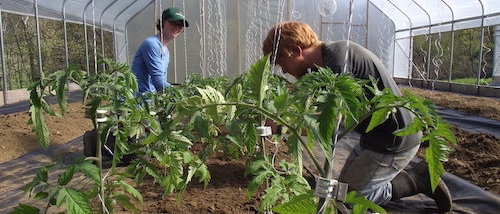Strategies to create a clean wash/pack environment that guarantees good food hygiene and workflow is the topic of this week’s pod, and for the first time ever we have three guests! With three guests and such an important topic, it’s no surprise this became the first of a two-part episode, with the second part following next week. In addition to getting produce clean and safe from pathogens, a good packing shed will facilitate workflow that keeps the produce moving and people comfortable. In this episode, we have the privilege of hosting Billy Mitchell, Chris Callahan, and Andrew Chamberlin, who share their expertise and insights on the importance of hygienic design in wash-pack systems.
In this episode we discuss:
00:01:00 - Importance of Food Safety,
00:05:13 - Ensuring Good Wash/Pack Production Flow
00:14:05 - Basics of Food Safety for Growers
00:15:10 - Key Points for Food Safety
00:15:58 - Simplifying Food Safety
00:20:12 - Importance of Cleaning
00:24:59 - Water Safety for Washing Produce
00:27:31 - The Use of Sanitizers in Wash Water
00:30:48 - Hygienic Design Principles
00:35:51 - Inspection vs. Audit
00:37:43 - Food safety starts in the field
00:41:30 - Color Coding for Organization and Cross-Contamination Prevention
00:42:05 - Using Shallow Totes and Mini Pallets for Field Efficiency
00:43:33 - Mobility Solutions in the Wash Pack Area
00:44:45 - In-field Cooling Strategies
00:48:25 - Forced Air Cooling for Extended Shelf Life
00:55:09 - The Importance of Cooling Methods
00:56:26 - Scale and Applicability of Hydrocooling
00:57:32 - Low-tech Cooling Techniques
00:58:29 - Water Quality Considerations
01:00:06 - Conclusion and Resources
Chris Callahan is the Extension Associate Professor of Agricultural Engineering at the University of Vermont- he works with food producers, processors, and distributors to improve the efficiency, quality and safety of post-harvest practices and storage processes like water management, environmental control, drying, humidification, and refrigeration systems. Andy Chamberlin is also with the U of VT, farmers with their post-harvest processes to increase efficiencies and profitability while maintaining safe food handling processes. Billy Mitchell is with the Southeast Region of the USDA's Transition to Organic Partnership Program and works with partners across the Southeast and nationally to provide educational opportunities to organic and transitioning to organic producers and the workforce that supports them.
In Shop Talk with Neversink Farm, we chat about new tools, old tools, how they can benefit your farm and tips to use them successfully with Conor Crickmore of Neversink Tools, which manufactures tools for farmers.
In this episode of Shop Talk with Neversink Farm, we discuss how to use low tunnels in the summer. Though it’s common to associate low tunnels with winter production, we talk about the strategies that make low tunnels effective in the hotter part of the season, most notably with shade cloth, which has the advantage that it can be watered through, unlike floating row cover and many of the other commonly used coverings. We also discuss how not using weights to hold down row cover saves time and offers more flexibility than having to move weights every time you need to access the crop.
Thanks to our collaborator on this podcast Neversink Farm. They make this podcast free to everyone with their generous support. For tools designed and made by farmers, check out www.NeversinkTools.com
Free articles mentioned in show:
Beat the heat in postharvest handling
https://growingformarket.com/articles/beat-the-heat-postharvest-handling
Love is Love Cooperative Farm Profile
https://growingformarket.com/articles/love-love-cooperative-farm-profile
Connect With Guest:
The guests' food safety resources are available at:
https://blog.uvm.edu/cwcallah/
Download A FREE Magazine Issue:
Go To Growing For Market Magazine: www.GrowingForMarket.com
